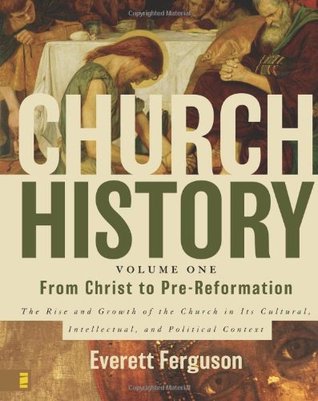Church History, Volume One is like what it says, about the history of the Church from the first century to the thirteenth century. I'm not even going to attempt to summarise contents, but the book basically looks at events, trends, and notable people in Church history. Each chapter also comes with a list of recommended resources, so you could (ideally) use this book as a starting point and then delve into certain issues or events.
I found this book easy to read and follow, even for someone like me, who has no formal education in Church history (apart from what I learnt in Sunday School). In fact, I was listening to one of my cousin's lectures of the Holy Spirit (she records her teachers and shares them with those interested) and I realised that it was easier to understand what the lecturer was saying, in part because I had already encountered the concepts and events mentioned in this book.
But though the book does explain the basics of certain theological issues (like the nature of Christ), because a certain level of understanding is needed to comprehend why the disputes were a big deal, I still found myself wishing for a theology textbook that I could use as a reference. So while the theology explanations are definitely adequate, they are not sufficient. Still, this is a history book so I shouldn't be quibbling.
And since Silence is still on my mind, or rather, it has been on my mind more than normal, I found myself particularly struck by the explanation of Christian persecution in Ancient Rome. In those times, religious functions were also used as expressions of political loyalty. And since Christians would not offer such sacrifices, they were seen as a threat to the Roman state. I thought that this was remarkably similar to the persecution depicted in Silence, which explains why it was controversial.
Oh, and while I'm on this topic, I also wanted to share that there was some discussion on whether Christians be persecuted on the basis of "the name" (aka being known as Christians) or for the crimes attached to the name. Christian apologists wanted it to be the latter, since they knew they were innocent, but guess which side won out?
I think that people interested in learning more about Church history should consider picking up this book. It's accessible, and I was able to follow what the author says without additional lectures - though I'm sure that lectures and discussions would have made it even better.
Disclaimer: I got a free copy of this book from the publisher via NetGalley in exchange for a free and honest review.
Wednesday, March 8, 2017
Church History: Volume One by Everett Ferguson
Labels:
Christianity
,
historical
,
NetGalley
,
non-fiction
Subscribe to:
Post Comments
(
Atom
)


No comments :
Post a Comment
I really do appreciate all comments, and I'll try my best to reply within 24 hours!
^_^